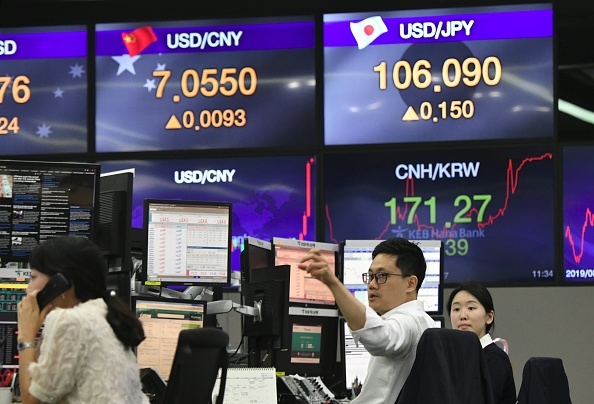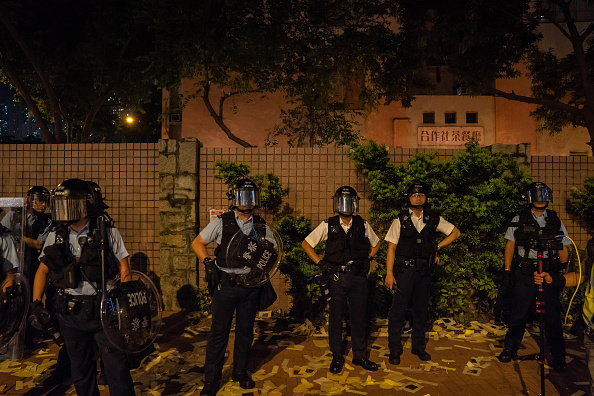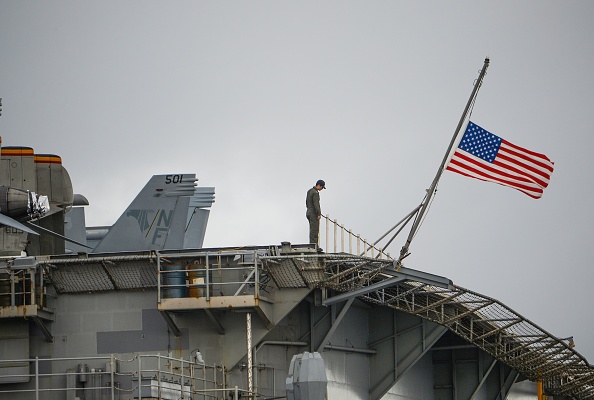
 Yuan on the Rocks
Yuan on the RocksThe Chinese government allowed the yuan to weaken past the symbolic 7-point mark against the American dollar this Monday, a move that rattled global markets. Analysts in the U.S. are interpreting the move as retaliation to President Trump placing a tariff on $300 billion worth of Chinese goods last Thursday, while China's central bank said that the devaluation of the yuan was not used "as a tool to deal with external disturbances such as trade disputes." Experts expect that the yuan's devaluation will eventually dilute the tariffs that have already been implemented by the U.S. This move, coupled with China's recent announcement that it will no longer purchase agricultural goods from the U.S., has escalated the trade war and flared tensions in the already strained U.S.-China relationship.
In response to the devaluation, the U.S. Treasury officially categorized China as a currency manipulator, a label that has not been used against China since 1994. With such a label in place, the U.S. is now required to meet with the International Monetary Fund, which released its own report this week finding "little [currency] intervention" by China, and calling for an equitable solution to the trade disputes. Ironically, some experts have long been calling on Washington to label China as a currency manipulator because of Beijing's efforts to keep its currency artificially high in recent years, the opposite of its move to now allow the markets to bring the value down. Those hopeful that an agreement might be reached in the next round of trade negotiations shouldn't hold their breath either, as the U.S. President signaled uncertainty around next month's trade talks. "We'll see whether or not we keep our meeting in September," Trump said on Friday. "If we do, that's fine. If we don't, that's fine."
 Meeting or Meddling?
Meeting or Meddling?In an attempt to explain the origins of the unrest in Hong Kong, China's state broadcaster CCTV has accused Julie Eadeh, a political counselor at the U.S. Consulate General in Hong Kong, as being a key figure in what it claims to be secret, foreign-backed instigation of the protests. Chinese media platforms have circulated a photo of Ms. Eadeh meeting with notable student demonstrators and have since pegged her as the face of an alleged foreign agenda to start a "color revolution" in the region. A U.S. State Department spokesperson hit back at Beijing this Thursday for its "thuggish" behavior, after a pro-Beijing, Hong Kong-based newspaper, Ta Kung Pao, released the personal information of Ms. Eadeh's family and children.
An increasing number of China-based media platforms have been reporting that foreign "black hands" are to blame for the start and progression of the movement in Hong Kong. Although experts think that Beijing is unlikely to intervene using the same force that it did 30 years ago, there is concern that this increasingly in-depth theory about a foreign-influenced revolution in Hong Kong is a subtle warning that Beijing is on the cusp of taking bigger steps to stifle the opposition.
 You've Got a Friend in Me
You've Got a Friend in MeThe U.S. aircraft carrier Ronald Regan moored off of Manila on Wednesday, a reminder to the Philippines that it can depend on the naval power of its decades-old ally in fending off China's territorial claims in the South China Sea. Cementing the show of support, U.S. Rear Admiral Karl Thomas told local journalists on Wednesday that the Ronald Reagan is "ready to respond to a wide range of operations, whether they be crisis or whether they be a humanitarian disaster response." While Filipino President Rodrigo Duterte has commented that the Philippine navy would be no match against China's, it is unclear if the Philippines is willing to upset Beijing by working more closely with the United States military. Although the Philippines won its South China Sea UN arbitration case against China in 2016, Duterte has claimed the Philippines is resolved to settle the dispute through bilateral negotiation rather than international intervention.
Washington's naval flex comes ahead of Duterte's meeting with Chinese President Xi Jinping later this month to discuss the 2016 arbitral case and other joint ventures, which may include China's role in developing the Philippines' newest telecommunications network. The Philippines is one of the latest countries to reject U.S. warnings against working with Huawei and other Chinese telecoms companies and instead has given China Telecommunications Corp. a green light to engineer a new service for the country. Washington has been outspoken in its warnings against that Huawei, alleging that the Chinese telecommunications company is deeply involved in cyberespionage for the Chinese government.
Prepared by China-US Focus editorial teams in Hong Kong and New York, this weekly newsletter offers you snap shots of latest trends and developments emerging from China every week, while adding a dose of historical perspective.
- 2019-08-02 Ratcheting Up the Crisis
- 2019-07-26 Playing Defense
- 2019-07-19 “Stain of the Century”
- 2019-07-12 Whichever Way the Wind Blows
- 2019-07-04 A Gentlemen’s Agreement
- 2019-06-28 A Truce on the Horizon?
- 2019-06-22 Three’s A Crowd
- 2019-06-14 Battle for Hong Kong
- 2019-06-07 Panda Diplomacy
- 2019-05-31 Trade Diversions
- 2019-05-25 Farm Aid or Band Aid?
- 2019-05-17 Risky Business
- 2019-05-10 Two Steps Forward, Two Steps Back
- 2019-05-03 The Final Laps?
- 2019-04-26 The Great Turbine Caper?
- 2019-04-19 Sowing Seeds of Tension
- 2019-04-12 Slow or Steady?
- 2019-04-05 The Last Mile is The Hardest
- 2019-03-29 From Negotiation to (Smart) Competition
- 2019-03-23 Xi Hits the Road